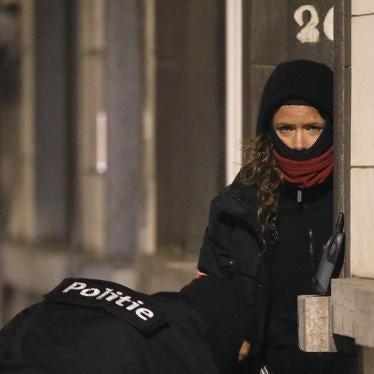Magomedkhan wanted to get married. He really did. He had identified a possible bride, but it was not his job to start the ball rolling! He asked his elder sister Zaira to visit the girl and tactfully establish whether she wanted to be married. Zaira agreed - after all, her brother was already 23, just the right age to bring home a bride.
On 30 November, 2010 Zaira went off to see the girl. Magomedkhan couldn't wait to find out if it was all going to work. It was 7.15 in the evening. He knew his sister must already be back home, so he rang her to get the news. She didn't pick up the phone. They live near each other in the village of Komsomolskoe on the edge of the Dagestani town of Kizilyurt, so he decided to go and see her. He arrived at her house at 7.30 to find her, of course, at home - she has small children, so where else would she be? It appeared she hadn't answered the phone, because it had fallen out of her pocket without her noticing.
Zaira had visitors. Some female relatives had dropped by, so he couldn't ask her what had happened. Brother and sister went into a huddle to discuss the matter in hand and then Zaira saw her brother out. They stood together in the street, eating sunflower seeds; a neighbour went by on his way home from work. It was about 7.45.
Magomedkhan finally went on his way. He couldn't know that at about 7.30 that same evening in the village of Stalskoe, not far from Kizilyurt, some militant wishing to defend Islamic morals had fired on a shop selling spirits, and set fire to it. Or that the police would come to his house later that night and arrest him as a suspect; that if he hadn't gone to ask Zaira for news and been seen by the relatives and the neighbour at just the time those unknown people were attacking the shop, he would have had no alibi and would be in a very tricky situation all things considering. Not, of course, that he has had an easy time of it anyway, but there are grounds for hoping that he will be released by a court of law.
On 30 November Magomedkhan went to bed just after 11. Thirty minutes later, there was a loud, insistent knocking at the gate. Magomedkhan and his older brother Shamil were awakened by members of their family, but they had been so deeply asleep that they couldn't understand what was happening. Their courtyard was full of people in military fatigues and in civvies. Some of them came into the house and seized Shamil. They stood him face to the wall and kept him covered. He was still trying to understand what was going on, but the night-time guests didn't answer any questions and just screamed threats.
Magomedkhan was dragged past Shamil by his hair, and their 16-year old nephew was pushed out into the street barefoot and half dressed. Patimat, Shamil and Magomedkhan's mother, was begging the police not to touch her sons or at least to explain what they were supposed to have done. When she saw Magomedkhan being dragged by his hair, the elderly woman fainted. Shamil requested assistance for her and that a doctor be called, but in vain. Finally he too was taken out with his brother and his nephew. They were shoved into a police van and taken to the Kizilyurt district police station.
Shamil and his nephew were held for most of the night in a cellar. They were not beaten, or even properly interrogated. They were asked a couple of questions: name, year of birth and address. So why had they been arrested?
Magomedkhan and another local guy, Rashid, who had been arrested that evening as his accomplice in the attack on the shop, were interrogated in an office - and they were well and truly "gone over". Shamil and his nephew could hear them screaming at the tops of their voices; they could hear the blows too. Before Shamil was taken down to the cellar, he had seen two policemen with electric shock machines going into the office where Magomedkhan was being interrogated. Shamil had a very good idea of what was going on there and could only pray that his brother would survive.
At about 3 in the morning Shamil was briefly taken into the investigating officer's study. He saw his brother, who had been very badly beaten up and was barely able to move his tongue. A couple of hours later, just before he and his nephew were taken home, Shamil persuaded one of the guards to allow him out to pray. He was taken out into the yard just as Magomedkhan was being led somewhere. Magomedkhan managed to whisper to Shamil that he had been badly beaten all night, tortured with electric shocks and had a gas mask put over his face, almost suffocating him. The same had happened to his friend Rashid. The police were attempting to beat a confession out of them, but both refused to accept any blame. Nevertheless, a week later the local TV programme «Dagestan News» showed pictures of them both, describing them as criminals who had been caught and confessed.
Magomedkhan Saipudinov was fairly lucky: his negotiations over a possible marriage had provided him with an alibi. Rashid Magomedov also turned out to have one: neighbours had seen him at home that evening. Both were fortunate that their relatives reacted quickly and hired good lawyers, who succeeded in having both young men medically examined and the electric shock torture marks on their hands officially recorded. The lawyers also established that the investigating officers had falsified the report on the identification of their clients by so-called witnesses to the crime. They discovered a series of procedural infringements and have no doubt that the case will collapse in court.
One would like to be able to believe that it will. But what can be going on in the heads of the two young men who were dragged off to the police station in the night, tortured until morning, threatened for several days, given virtually no food and told to stop complaining or things would only "get worse?" They remain in custody until their case comes up in court.
The preliminary hearings only took place on 21 February, so the case will not be concluded until the spring. They're not being beaten any more, they're allowed to receive parcels and are not being ill treated, it seems. But they'll have been in prison for months: time hangs heavy on their hands, a new year has started, Magomedkhan's mother has become ill from stress and his fiancée has probably stopped thinking about his offer of marriage. Even if she hasn't, her family is surely none too pleased at the idea of a suitor who's spent time behind bars, especially as he's been shown on TV as an Islamist extremist and arsonist. Even if the court completely clears him, it's obvious to anyone that the security services will have their eye on him and he'll be on their list of extremists, which can only lead to difficulties in the future. Once you've got into the system, there's no longer any possibility of a normal life.
But what about the "officers" who did all this to you - beat you, administered electric shocks to your fingers and maltreated you? Will nothing happen to them? Nothing at all? Probably not. The request by Magomedkhan Saipudinov and Rashid Magomedov to institute criminal proceedings for illegal methods of interrogation was refused, after all. They're not the first and they won't be the last.
Dagestan has become Russia's No 1 hot spot these days and the authorities talk a great deal about stabilising the situation, the need for dialogue with various forces inside society and for a consensus. They are apparently trying to weaken support among the population for the militants who are becoming ever more active in the region. One of President Magomedsalam Magomedov's main projects is the creation of a "Commission for the social rehabilitation of former militants". This Commission was formed at the beginning of November last year, just a few weeks before Magomedkhan Saipudinov and Rashid Magomedov were taken in to the Kizilyurt District Police Station.
The Commission is headed by Rizvan Kurbanov, First Deputy Prime Minister, who is responsible for overseeing the republic's security agencies. Members include heads of republican law enforcement bodies and other high-ranking officials; also the Dagestani Ombudsman, the head of the Chamber of Lawyers and even a well-known Salafi scholar. The Commission aims to assist people who want to come out of the forest, to give guarantees of legal protection and physical safety to those prepared to lay down their arms. This is, of course, important. Better with the Commission than without it.
But attempts to return people who had joined the militants to normal life are of themselves insufficient. It is essential to ensure that no reinforcements go into the forest: everything should be done to see that young men are not motivated to join the militants. If they have been treated like Magomedkhan and Rashid at the Kizilyurt police station, then it's hardly surprising that they do.
Dagestan's security services carry on in this fashion, and the officers are confident that they are above the law. If torture is widespread and no one has been brought to court for it, then why not carry on that way? All those commissions can do their work: they won't stop arrested people being beaten up, or even their lawyers if they are too active in the defence of their clients. Everyone knows that the young woman lawyer Sapiat Magomedova was beaten up by the police in Khasavyurt. They know who did it too and that these people still working in the police. In the six months after Sapiat was beaten up, another three women lawyers were to experience rough handling. Why should this be happening to the women? Well, a man can give as good as he gets, but what can a woman do? If she doesn't go along with it, all she can do is write complaints, but they have never got anyone anywhere, and still don't.
Before I left Dagestan I spoke to Sapiat Magomedova and to her lawyer colleagues who have suffered at the hands of the men in uniform. One of the lawyers I talked to had actually gone to the Kizilyurt police station to represent someone who had been arrested - not for terrorism or extremism, just for a petty crime. A senior local police official was not pleased she had come and asked, "Where do you think you're going, you bitch?" She started explaining her rights as a lawyer and that "there is a law in operation". At this the police chief really lost it and started to threaten in sexually explicit terms what he would do to her, "You whore, I'll make you suck me." As she was leaving, she swore through her tears that she would complain all the way up to the top. The police chief only redoubled his foul-mouthed threats. She did, of course, complain, but that was six months ago and nothing has happened.
These days the answer to any question from officials in Dagestan promises that the Social Rehabilitation Commission will resolve all the current problems and lead the republic out of its crisis. But incidents like those I have described cannot but bring to mind the quote from Jaroslav Hasek's Svejk: "Did you think, you scoundrels, that the Commission would help you?" said the colonel. "Like hell it will!"
It hasn't so far......







